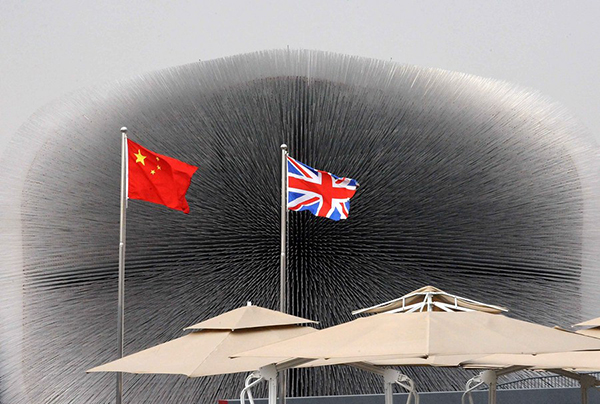FENG Zhongping:China, UK should seek common ground, shelve differences
Feng Zhongping, director of the Institute of European Studies of the Chinese Academy of Social Sciences.
The article was originally published in China Daily Global on May 31, 2022. The article has been authorized.

National flags of China and Britain are seen in front of the UK pavilion in the World Expo Park in Shanghai, East China, April 23, 2010. [Photo/Xinhua]
China and the United Kingdom are both major economies and permanent members of the United Nations Security Council. China-UK relations not only concern the two countries but also have an important impact on international multilateral institutions and global governance.
China is now the second-largest economy in the world, with its GDP exceeding $17.7 trillion in 2021.Many people predict that China will soon surpass the United States as the world's largest economy, though not in terms of per capita GDP.
In 2021, meanwhile, the UK's economy ranked fifth in the world, with GDP of about $3.19 trillion.
Economic cooperation has always been very important for China and the UK, whose economies are highly complementary.
Trade and financial cooperation have closely linked the two countries. In the 50 years since China and Britain established full diplomatic relations, trade between the two countries has been growing. China-UK financial cooperation has also grown rapidly in recent years. In 2021, China became the UK's largest source of imports, and bilateral trade exceeded $100 billion.
The reason for the close economic and financial cooperation between China and the UK is that each side recognizes the other's importance.
Since the founding of the People's Republic of China in 1949, the UK has realized that China is a big country and should not be isolated. Only three months after the founding of New China, Britain decided to recognize it, becoming the first Western country to do so. However, due to the outbreak of the War to Resist US Aggression and Aid Korea (1950-53), it wasn't until 1972 that both sides upgraded their bilateral relations to the ambassadorial level.
At present, China-UK ties are facing many difficulties, and many people are worried about the future of the relations. As the US views China as a strategic competitor and Russia's relations with the West turn confrontational, the world is likely to return to the era of confrontation.
US President Joe Biden's trip to Asia, including a visit to the Republic of Korea's capital, Seoul, and a meeting in Tokyo involving the US, Japan, India and Australia, sent a message that the US is rallying its allies in the Asia-Pacific region to contain China.
In Europe, after the outbreak of the Russia-Ukraine conflict, the US and Europe united against Russia.
China and the UK should step up dialogue and get to know each other better. It is in neither side's interests for the world to go back to confrontation.
China does not want to change or overhaul the existing international system, as some people claim. Instead, China supports and defends the UN system. The UN Charter and principles should be the rules that all countries abide by. China has no international ambitions, and the Belt and Road Initiative aims to promote regional economic integration.
China and the UK should step up exchanges and dialogue, both bilaterally and multilaterally, to remove mutual misgivings.
What can we learn from the 50 years of ambassadorial-level diplomatic relations between China and the UK?
First, two countries, though having different political systems, can not only coexist peacefully but also achieve mutual benefits and win-win results.
Second, China and the UK have the capacity and responsibility to jointly provide public goods to the world, including tackling the climate crisis, combating international terrorism and safeguarding regional peace and stability.
At present, though China-UK relations face many difficulties and challenges, we should not isolate ourselves from each other. We should seek common ground while putting aside differences, identify and redefine our common interests, and then look for ways to realize these common interests. It is our responsibility to give each other a full and objective view.
